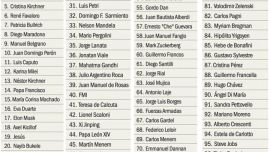The Federal Court of Appeals has revoked the dismissal of charges against Vice-President Cristina Fernández de Kirchner in the so-called 'K money route' money-laundering case.
The decision comes after the judges leading the court admitted accepted an appeal against the clearing of charges and ordered the probe to be re-opened by Federal Judge Sebastián Casanello.
Federal Appeals Court Judges Mariano Llorens and Pablo Bertuzzi admitted an appeal from an NGO named Bases Republicanas Civil Association. The third magistrate hearing the appeal, Eduardo Farah, dissented against the ruling.
Casanello, acting upon a request filed by the case’s lead prosecutor Guillermo Marijuan, ruled back in June there was no evidence the former president was involved in a crime in the long-running probe known as the ‘Ruta del dinero K’ or “K money trial case.”
Marijuán had filed a statement with the court stating that there was “absence of elements to support the accusation against Cristina Elízabeth Fernández" in the money-laundering case. Declaring that there was no evidence to indict her, the prosecutor highlighted that specialists from the AFIP tax agency and UIF money-laundering watchdog had reached the same conclusion and also requested dismissal.
The ‘Ruta del dinero K’ case focuses on corruption and money-laundering offences allegedly committed between 2003 and 2015. It centres on Kirchnerite ally and business tycoon Lázaro Báez, a former bank cashier who created a business empire in Santa Cruz Province in Argentina’s south, winning tenders for oil and public works projects via his Austral Construcciones firm during the 12-year period spanning the presidencies of Néstor Kirchner and Cristina Fernández de Kirchner.
Argentina's vice-president has been under investigation in the case for a decade. She has consistently denied the allegations against her and maintains that she is a victim of political and judicial persecution.
To date, a total of 17 people have been found guilty of corruption changes and sentenced. They include Báez, who received 12 years in prison; Báez's son Martín, who was sentenced to six years and six months; and whistleblower Leonardo Fariña, who was given three and a half years.
No public officials have been sentenced in the case to date. The allegations are also linked to another trial investigating alleged public works graft, also focused on tenders given by Fernández de Kirchner's government to firms owned by Báez.
Despite Casanello highlighting a “lack of merit” in an earlier ruling, the Federal Court of Appeals has now ordered him to re-open the investigation.
In their ruling, Judges Llorens and Bertuzzi strongly criticised Marijuan's decision to consent to he case's dismissal, saying his opinion "appears to be a biased assessment."
According to the magistrates, the prosecutor did not take into account the evidence presented by counterpart Diego Luciani in proceedings related to another public works fraud investigation and questioned the admissibility of witness statements by former Kirchnerite government officials turned whistleblowers in other corruption cases.
Fernández de Kirchner, who maintains her innocence, came out fiercely against the court's ruling and slammed the lack of "independence" of the Judiciary.
She alleged that the magistrates were responding to political pressure, highlighting that former president Mauricio Macri – her political arch-enemy of recent years – had been cleared in a espionage trial on the very same day that she had suffered a judicial setback.
– TIMES/NA




















Comments